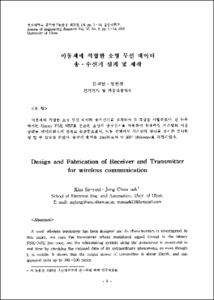환경규제와 수출경쟁력 분석
- Alternative Title
- Environmental Regulation and the Competitiveness of Korean Manufacturing
- Abstract
- 환경규제의 강화는 단기적으로는 업종에 따라서 심각한 경쟁력 약화를 초래할 수도 있으나, 장기적으로는 특정산업 및 특정기업의 경쟁력을 오히려 제고시킬 수 있다. 물론 여기에는 수많은 다른 요인들이 복합적으로 작용하기 때문에 일반화하기는 어렵다. 그러나 한가지 확?피? 것은 환경정책과 산업경쟁력은 상호의존적이라는 것이다. 그러므로 환경정책과 산업정책의 조화 없이는 산업경쟁력의 제고와 환경개선이라는 두가지 목표를 동시에 달성한다는 것은 거의 불가능한 일일 것이다.
한편 수출 증가율과 시장점유율 변화를 통해 분석한 우리나라의 환경규제와 공해상품의 수출경쟁력과의 관계를 보면 다음과 같다. 수출경쟁력이 강화된 공해상품으로는 정제석유제품, 화학원소 및 동 화합물, 철강괴 및 강판, 알루미늄 등이며, 수출경쟁력이 약화된 공해상품으로는 시멘트, 칼붙이, 비금속제 가정장비 등으로 나타났다. 그러나 대부분의 산업에 있어서 환경규제의 강도는 경쟁력을 결정하는 중요한 요인이 아니며, 아직도 임금비용 수준의 차이, 원자재 비용의 차이, 기간산업 등 전통적인 요소들이 환경적인 영향을 능가하고 있다.
In the short run, environmental regulation inevitably raises costs and tends to reduce the market share of domestic companies on global markets. But in the long run, properly designed environmental standards can trigger innovation. Such innovation can not only lower the net cost of meeting environmental regulations, but can even lead to absolute advantages over firms in foreign countries. So, the relationship between environmental goals and industrial competitiveness has normally been interdependent. Therefore, the issue is how to balance society's desire for environmental protection with the economic burden on industry.
In our analysis, for the petroleum products, chemical elements & compounds, ignots & plates of iron or steel and nonferrous metals, competitiveness is enhanced. But, for the cement, cutlery and household equipment of basemetal, competitiveness is decreased. Therefore, environmetal factors are not important to determine the competitiveness, but conventional factors, such as wage, material cost, etc., are still important.
In the short run, environmental regulation inevitably raises costs and tends to reduce the market share of domestic companies on global markets. But in the long run, properly designed environmental standards can trigger innovation. Such innovation can not only lower the net cost of meeting environmental regulations, but can even lead to absolute advantages over firms in foreign countries. So, the relationship between environmental goals and industrial competitiveness has normally been interdependent. Therefore, the issue is how to balance society's desire for environmental protection with the economic burden on industry.
In our analysis, for the petroleum products, chemical elements & compounds, ignots & plates of iron or steel and nonferrous metals, competitiveness is enhanced. But, for the cement, cutlery and household equipment of basemetal, competitiveness is decreased. Therefore, environmetal factors are not important to determine the competitiveness, but conventional factors, such as wage, material cost, etc., are still important.
- Issued Date
- 1996
- Type
- Research Laboratory
- Alternative Author(s)
- Choi, Byong-Cheol
- Publisher
- 사회과학논집
- Language
- kor
- Rights
- 울산대학교 저작물은 저작권에 의해 보호받습니다.
- Citation Volume
- 6
- Citation Number
- 2
- Citation Start Page
- 95
- Citation End Page
- 122
- Appears in Collections:
- Research Laboratory > Journal of social science
- 파일 목록
-
-
Download
 000002024602.pdf
기타 데이터 / 847.34 kB / Adobe PDF
000002024602.pdf
기타 데이터 / 847.34 kB / Adobe PDF
-
Items in Repository are protected by copyright, with all rights reserved, unless otherwise indicated.